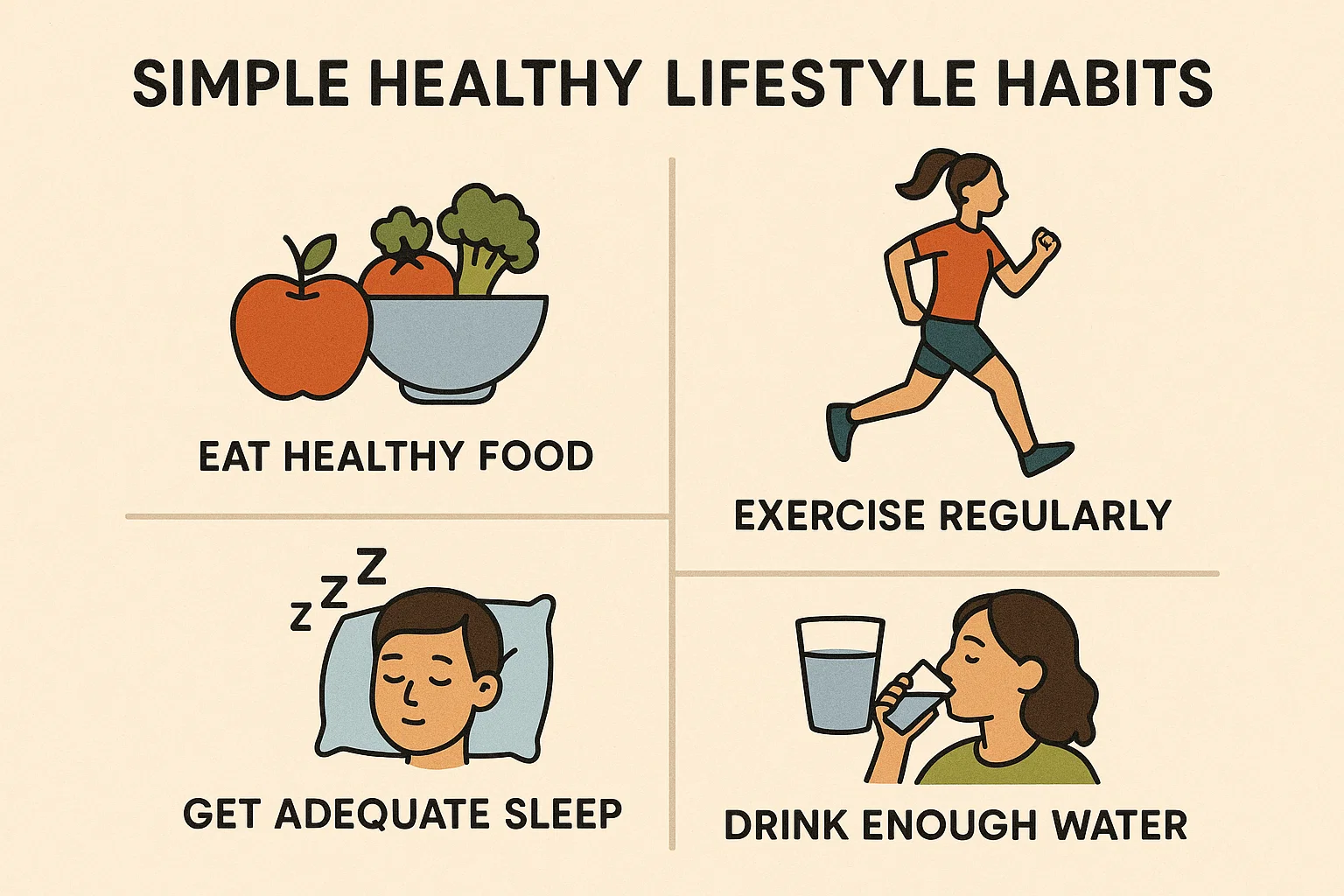
If you’ve ever told yourself, “I need to start living healthier, but I don’t know where to begin,” you’re definitely not alone. Most people want more energy, better sleep, less stress, and a stronger body—but the idea of massive lifestyle changes is intimidating. The truth is that you don’t need a strict diet or extreme workout routine. Simple healthy lifestyle habits—small, practical actions done consistently—can transform your health far more effectively than short-lived motivation. In this guide, you’ll learn realistic, science-backed habits you can start today. Each strategy is easy, flexible, and designed for long-term success, even if you have a busy schedule.
Why Simple Healthy Lifestyle Habits Matter More Than Motivation
Most people rely on motivation to start a new routine, but motivation is famously unreliable. Some days you feel inspired; other days, you don’t want to do anything. That’s why simple healthy lifestyle habits are so important—they work even when your motivation fades. Daily habits slowly rewire your brain, turning healthy actions into automatic behaviors. When your default choices become nutritious meals, regular movement, better sleep, and stress management, you don’t have to “push yourself” constantly. These habits also create compound benefits: you sleep better, which improves your mood, making it easier to exercise and eat well. Over time, these small actions lead to major long-term improvements in physical health, emotional balance, and overall quality of life.
Simple Healthy Lifestyle Habits for a Strong Morning Routine
Your morning routine sets the tone for your day. When you begin your morning intentionally, with habits that energize your body and mind, you create momentum that carries you into your afternoon and evening. A strong morning routine doesn’t have to be complicated or time-consuming. In fact, the most effective simple healthy lifestyle habits take just a few minutes but offer benefits like improved focus, steadier energy, better digestion, and reduced stress. The key is choosing habits that feel doable and enjoyable for you so they become easy to maintain. Below are three foundational habits to build a morning routine that supports health and productivity.
1. Hydrate Before You Caffeinate
Drinking water first thing in the morning is one of the simplest yet most powerful healthy habits you can adopt. After several hours of sleep, your body becomes mildly dehydrated, which can affect your mood, focus, and metabolism. Hydrating before consuming caffeine helps your body wake up naturally and supports better digestion throughout the day. It can also prevent headaches, reduce grogginess, and kick-start your metabolism. Many people notice a calmer stomach and improved bowel movements just from starting the day with water. If plain water feels boring, try adding lemon slices, mint leaves, or cucumber for a refreshing flavor boost. This small act can become a cornerstone of your morning wellness routine.
2. Move Your Body for 5–10 Minutes
A short burst of movement in the morning can dramatically improve your energy, circulation, and mental clarity. You don’t need to commit to a full workout session—just 5 to 10 minutes of gentle activity can wake up your muscles and reduce stiffness. Activities like yoga, stretching, simple cardio, or a light walk can increase blood flow, trigger feel-good hormones, and ease any tension built up from sleep. This simple healthy lifestyle habit also sets a positive tone for the rest of your day. When you begin your morning with movement, you’re more likely to make healthier choices later, such as eating better and staying active. Over time, this quick habit can evolve into a regular exercise routine naturally.
3. Take 2 Minutes to Breathe or Reflect
Mindfulness in the morning may be one of the most underrated healthy lifestyle habits. Spending just two minutes focusing on your breath or reflecting on your goals helps regulate your nervous system, reduce stress, and bring your mind into the present moment. This habit can be as simple as inhaling deeply for four seconds, holding for four seconds, and exhaling for six seconds. You can also practice gratitude by naming three things you appreciate. These small acts create mental clarity, emotional grounding, and a sense of purpose that shapes your entire day. Adding mindfulness to your morning routine is a realistic, low-effort habit with high-impact results.
Simple Healthy Lifestyle Habits for Eating Well
Healthy eating doesn’t need to feel restrictive or complicated. Instead of focusing on strict diets, calorie counting, or eliminating entire food groups, aim to incorporate more simple healthy lifestyle habits that make nutritious choices easier and more appealing. Eating well is about building balanced meals, planning ahead, choosing whole foods over processed options, and listening to your body’s hunger signals. When you adopt simple habits like meal planning, mindful eating, and smart snacking, you naturally improve your energy, metabolism, digestion, and overall wellness. Below are realistic and sustainable approaches to creating a healthier relationship with food.
4. Build Balanced Plates (Without Overthinking)
Creating balanced meals is easier than most people think. A healthy, satisfying plate includes the right mix of nutrients that keep your blood sugar stable and your energy levels consistent. Think of your plate as having three main components: vegetables or fruits, a source of lean protein, and a healthy carbohydrate. Add a small portion of good fats like nuts, seeds, or avocado for satiety. This simple formula helps reduce overeating, minimizes cravings, and ensures you’re getting essential vitamins and minerals. Balanced plates also improve digestion and help regulate your metabolism. Once you get into the routine, you’ll be able to put together nutritious meals quickly and with minimal effort.
5. Plan Simple, Healthy Snacks
Snacking isn’t the problem—mindless snacking is. By preparing healthy snacks in advance, you can avoid the temptation to grab sugary or processed foods when hunger strikes. Keep snacks like fruit, nuts, yogurt, and chopped veggies easily accessible so you’re more likely to reach for them. Healthy snacks stabilize your blood sugar, prevent afternoon crashes, and support weight management. They can also reduce emotional eating by helping you stay satisfied throughout the day. This simple healthy lifestyle habit makes healthy choices easier and keeps you in control of your nutrition.
6. Drink Fewer Calories
Liquid calories can sneak into your diet without you realizing it, contributing to weight gain and energy crashes. Beverages like soda, sugary coffee drinks, energy drinks, and packaged juices often contain more sugar than you might expect. By swapping these drinks for water, herbal tea, or infused water, you immediately reduce excess sugar intake and support better hydration. Drinking fewer calories is one of the easiest ways to support weight management without feeling deprived. This habit also improves digestive health, skin clarity, and overall wellbeing—making it a powerful yet simple practice to incorporate into your routine.
Simple Healthy Lifestyle Habits for Staying Active
You don’t need a gym membership or a complex workout regimen to stay active. What truly matters is movement—consistent, daily movement that strengthens your muscles, supports your heart, and boosts your mood. Even small efforts add up over time. When you incorporate simple healthy lifestyle habits like walking more, breaking up long periods of sitting, and doing short strength exercises, you cultivate a sustainable fitness routine. Staying active becomes something you do naturally, not something you force. Below are practical ways to increase your daily activity even if you have a busy schedule.
7. Aim for More Daily Steps
Walking is one of the most accessible and effective forms of exercise. It improves cardiovascular health, supports weight management, enhances mood, and reduces stress. You don’t have to hit 10,000 steps every day to see benefits. Start with a realistic step count and gradually increase it over time. Try taking a short walk after meals, parking farther from store entrances, or pacing while you talk on the phone. These small adjustments can significantly increase your daily step count without requiring extra time or effort. Over time, walking becomes a natural part of your daily routine and contributes to long-term health.
8. Add Short Movement Breaks During the Day
Sitting for long periods can lead to stiffness, poor posture, and reduced energy. Incorporating quick movement breaks throughout your day can counteract these effects. Every hour or so, stand up, stretch your arms and legs, walk around your home or office, or do a few simple exercises like shoulder rolls or calf raises. These short breaks help improve circulation, maintain flexibility, relieve tension, and keep your mind alert. This simple healthy lifestyle habit is especially important for people with desk jobs. The more frequently you break up long periods of sitting, the healthier and more energized you will feel.
9. Do Strength Exercises 2–3 Times a Week
Strength training is essential for building and maintaining muscle, supporting joint health, and boosting your metabolism. You don’t need weights or fancy gym equipment to get started. Bodyweight exercises like squats, lunges, push-ups, planks, and glute bridges are effective and beginner-friendly. Just 10–20 minutes, two or three times a week, can help improve your stability, reduce your risk of injury, and make everyday tasks easier. This habit also increases bone density and supports long-term mobility—especially as you age. Strength training is one of the most impactful simple healthy lifestyle habits you can add to your weekly routine.
Simple Healthy Lifestyle Habits for Better Sleep
Sleep is the foundation of health, influencing everything from your immune system to your mood and metabolism. Improving your sleep doesn’t require drastic changes—just a few consistent habits that signal your body when it’s time to rest. Prioritizing sleep enhances your energy levels, focus, emotional regulation, and overall wellbeing. Below are simple and effective habits to improve the quality and quantity of your sleep.
10. Keep a Consistent Sleep Schedule
Going to bed and waking up at the same time every day is one of the most effective ways to regulate your internal clock. When your sleep schedule is consistent, your body knows when to release hormones like melatonin, helping you fall asleep faster and wake up feeling refreshed. A predictable sleep-wake cycle improves mental clarity, reduces stress, and boosts your energy throughout the day. Even on weekends, try to stay within an hour of your usual times. This simple healthy lifestyle habit can significantly improve your quality of life without requiring any extra time or money.
11. Create a Short Wind-Down Routine
A calming nighttime routine signals your body that it’s time to rest. Activities like dimming the lights, reading a book, stretching, or taking a warm shower help your brain transition from “active mode” to “sleep mode.” Try to avoid screens and stimulating activities at least 30 minutes before bed, as blue light can interfere with melatonin production. A relaxing wind-down routine can reduce stress, calm your mind, and help you fall asleep faster. Over time, your body will associate these actions with bedtime, making it easier to unwind each night.
12. Make Your Bedroom Sleep-Friendly
Your sleep environment plays a major role in how well you rest. A cool, dark, and quiet bedroom can dramatically improve your sleep quality. Consider using blackout curtains, white noise machines, or comfortable bedding to create a peaceful atmosphere. Removing distractions like bright lights, clutter, or electronics can help your mind relax. A supportive mattress and pillows also contribute to better sleep posture and reduced discomfort. This simple healthy lifestyle habit transforms your bedroom into a space dedicated to rest and rejuvenation.
Simple Healthy Lifestyle Habits for Mental and Emotional Wellness
Your mental and emotional health significantly influence your physical wellbeing. Stress, overwhelm, and negative emotions can affect sleep, digestion, energy, and motivation. Building simple healthy lifestyle habits that support your mental wellness can create a more balanced, fulfilling life. These habits don’t require hours of meditation or therapy—just consistent, small actions that help you stay grounded and emotionally resilient. Below are key practices to improve your emotional wellbeing.
13. Practice Daily Mindfulness (Even for 3 Minutes)
Mindfulness helps you focus on the present moment, reducing anxiety and stress. Even a few minutes a day can make a meaningful difference. Mindfulness practices like breathing exercises, guided meditation, or mindful walking can improve your ability to manage emotions and increase self-awareness. This habit helps quiet mental chatter, improve concentration, and enhance your overall sense of calm. Incorporating mindfulness into your daily routine doesn’t require special tools—just your attention and intention. Over time, this simple practice can significantly improve your mental clarity and emotional balance.
14. Protect Your Boundaries and Say “No” More Often
Healthy boundaries are essential for preserving your mental and emotional energy. Saying “yes” to everything can lead to burnout, resentment, and stress. Learning to say “no” with confidence allows you to prioritize your time and wellbeing. Boundaries help you avoid overcommitment and make space for the activities and relationships that truly matter. This simple healthy lifestyle habit empowers you to take control of your life, build healthier relationships, and maintain balance. Whether it’s at work, with friends, or in your personal life, setting boundaries is an act of self-respect and self-care.
15. Nurture Your Relationships
Strong relationships provide emotional support, reduce stress, and contribute to long-term health and happiness. Nurturing your connections doesn’t have to be time-consuming. Simple actions like checking in with a friend, scheduling regular calls, or spending quality time with loved ones can strengthen bonds. Engaging in meaningful conversations, practicing empathy, and being fully present during interactions help build deeper connections. This habit boosts your mood, increases your sense of belonging, and supports emotional resilience. Investing in relationships is one of the most fulfilling simple healthy lifestyle habits you can develop.
Simple Healthy Lifestyle Habits to Manage Stress
Stress is a natural part of life, but chronic stress can take a toll on your physical and mental health. Learning to manage stress effectively doesn’t require complicated techniques—just practical habits that help you stay grounded and calm. Incorporating daily stress-relief practices into your routine improves your emotional wellbeing, focus, and overall happiness. Below are simple yet powerful habits to help you cope with stress.
16. Use “Mini Resets” Throughout the Day
A mini reset is a short break that helps you release tension and refocus. These can be as simple as taking a few deep breaths, stepping outside for fresh air, or stretching your body. Mini resets interrupt stressful moments before they escalate, helping you stay calm and productive. This simple healthy lifestyle habit is especially useful during busy or overwhelming days. By incorporating multiple resets into your schedule, you can maintain your energy, prevent burnout, and reduce overall stress levels.
17. Schedule Joy, Not Just Tasks
Many people fill their schedules with obligations and forget to make time for things that bring them joy. Activities you enjoy—whether it’s listening to music, reading, cooking, or spending time outdoors—are essential for emotional wellbeing. Scheduling joy increases your happiness, lowers stress, and promotes balance. This habit also helps you feel more energized and motivated throughout the week. Joyful activities act as emotional anchors, giving you something to look forward to and helping you stay grounded, even during stressful periods.
How to Make Simple Healthy Lifestyle Habits Stick
Creating new habits is challenging, but with the right strategies, it becomes much easier. The goal is to make healthy choices simple, automatic, and enjoyable. Instead of relying on motivation, use systems and routines that support consistency. Below are techniques that help transform healthy behaviors into long-term habits you can actually maintain.
18. Start Tiny (Seriously Tiny)
The biggest mistake people make when starting a new habit is trying to do too much too quickly. Starting tiny—like drinking one extra glass of water or walking for five minutes—makes the process manageable and builds confidence. Tiny habits eliminate resistance because they feel easy to accomplish. Over time, these small actions accumulate and naturally expand into larger habits. This method reduces the pressure of perfection and makes healthy living feel more attainable.
19. Stack New Habits onto Existing Ones
Habit stacking is a powerful technique where you link a new habit to an existing routine. This could be drinking water right after brushing your teeth, stretching while your coffee brews, or taking a short walk after lunch. By connecting new habits to established behaviors, you create a natural trigger that helps the new habit stick. Habit stacking makes routines more predictable and reduces the mental effort required to remember your healthy intentions.
20. Focus on Progress, Not Perfection
No one is perfect, and aiming for perfection often leads to frustration. Instead, focus on steady progress. Celebrate small wins, acknowledge your efforts, and be kind to yourself when setbacks happen. Life is unpredictable, and missing a habit occasionally doesn’t erase your progress. What matters is getting back on track. This mindset encourages long-term consistency and helps you build a healthier lifestyle without guilt or pressure.
Conclusion
Healthy living doesn’t require drastic changes—just consistent, simple healthy lifestyle habits that fit into your daily routine. Whether it’s drinking more water, walking each day, eating balanced meals, or prioritizing sleep, small choices create big results over time. Start with one habit, master it, and build from there. Your healthier, happier future begins today—one simple habit at a time.
FAQs
1. How do I start a healthy lifestyle if I’m completely out of shape?
If you’re starting from zero, begin with very small habits. Walk for 5–10 minutes, add one serving of vegetables, and drink more water. These easy steps help build confidence and momentum.
2. How many habits should I work on at once?
Focus on 1–3 habits at a time. Taking on too much at once can lead to burnout. Small, steady change is more sustainable and effective.
3. How long does it take to form a habit?
On average, habits take anywhere from 3 weeks to 3 months to become automatic. Consistency matters more than speed.
4. Do I need a strict diet to live a healthy lifestyle?
Absolutely not. Balanced eating focused on whole foods is far more sustainable than restrictive diets.
5. What if I don’t have time for exercise?
Short sessions count. Even 5–10 minutes of movement throughout the day adds up and contributes significantly to your health.
Read More: 10 Inspiring Ideas for a Perfect Minimalist Home Lifestyle



